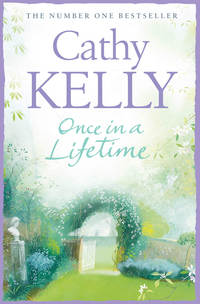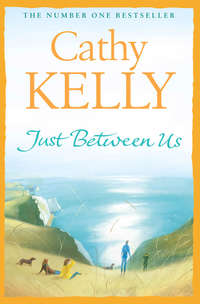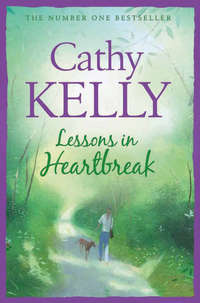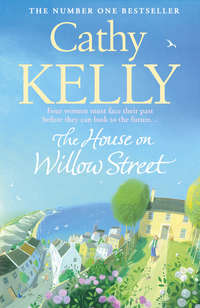
Полная версия
The House on Willow Street
The noise was different outside the house: rain landed more softly on grass and danced lightly on bronzed leaves. Without windows to wail against, the wind lashed the circle of ancient trees in Danae’s garden. But the trees fought back, unbending. Their leaves whipped, their branches flexed, but the trunks stood immovable.
Danae walked stiffly across the small lawn to the largest, oldest tree, her beloved oak with its barrel trunk. Under the shelter of the giant oak, Danae leaned back and felt Lady’s cold nose reach questing into her hand.
Lady wasn’t afraid of storms. Her gleaming eyes shone up at her mistress with utter devotion.
Danae wasn’t afraid of storms, either. It was the same with the dark. People who’d never felt the pure darkness of life itself were scared when night fell. People who understood the darkness knew that lack of light wasn’t the problem.
Lightning rent the sky and even Lady quivered at the sight.
Something was happening, Danae decided. That was what such wild September storms signified: newcomers and a change. A change for Avalon.
Danae was no longer scared of change. Life was all change. Endlessly, unrelentingly. And all she wanted was peace, but it never came.
Chapter One
Early mornings in Avalon were among Tess Power’s favourite times of the day. On a weekend, nine-year-old Kitty would sleepily climb into her bed and snuggle up to her mother. And sometimes – only sometimes, because he often forgot – Zach would bring her a cup of tea in bed. This would never happen on a weekday like today, when Zach remained buried under his duvet until she hauled him out to go to school.
‘Teenagers need extra sleep, Ma,’ he’d plead. ‘It’s official: I read it on the Internet. Ten minutes more …’
Anything to do with her two beloved children made her happy – unless it was detention for Zach or an argument with Kitty over eating any foodstuff which could be classed as a vegetable: ‘I hate broccoli and tomatoes and all greens, so there!’
That aside, Zach and Kitty’s existence made Tess giddy with happiness. But there was something special about weekday mornings like this one, when she would slip out while the children were still sleeping and take Silkie, the family’s fawn-coloured whippet, for a walk in the woods beside the home where she’d grown up.
Up here with the wind whistling around them it felt as if Tess and Silkie were the only creatures in the world. As they approached the abbey ruins, Silkie suddenly turned and ran with easy greyhound grace over fallen leaves and twigs in the direction of the great house. Tess hesitated a moment before following. Even though she came up here almost every day for a bit of early morning meditation while gazing out to sea, she rarely went too close to Avalon House.
It was nearly two decades since she had left her old home, had watched it sold to strangers, knowing how desolate her father would have been if he’d lived to see it. And despite that lapse of time the pain had not lost its edge, so she tended to steer clear of the house, rarely venturing into the grounds, let alone inside.
Silkie, thrilled with this rare adventure, had found a path through the undergrowth. Tess didn’t know what was drawing her towards Avalon House, but she followed, picking her way gently through the brambles and briars that had taken over the beautiful gardens her father had worked so hard to maintain. He had loved that garden, and it was strange that neither Tess nor Suki, her older sister, had shown even the slightest interest in gardening. Back then, they’d looked on gardening as a grown-up’s pastime. Now, Tess found that the smell of freshly dug earth took her back to the lovingly tended gardens of the house at the end of Willow Street and awakened an overwhelming sense of loss.
Stop being so melodramatic, she told herself briskly, lots of people have to move from the house they were born in!
Yes, that was the attitude. Show some Power backbone.
She marched on, determined to have a good walk. She was perfectly able to approach the house and look at it and check how far into disrepair it was falling. The American telecoms millionaire who’d bought it ten years ago had lost all his money and now there was no chance that he and his wife would come here to restore the house to its former glory.
Avalon House was not the most beautiful piece of architecture, but it was certainly majestic, and its hotchpotch of styles reflected the fluctuating fortunes of the de Paors. There was a Victorian great hall, a Norman tower that nobody was ever allowed in because it was a danger zone, and a crumbling Georgian wing. The entire place was shabby and decaying when Tess and Suki were children. They’d lived in the most modern part of the house, which dated back just over a century; despite the vast space, the only inhabitable parts of the old building were the kitchen, the library with its panelling and huge fireplace, and the back stairs that led to the bedrooms.
The De Paor fortune had long since vanished, leaving no cash for fires or modern heating. As a child, Tess had been conditioned to turn the lights off and to put as many blankets as she could on the bed to keep out the icy breeze that wound up from the coast to the house on the hill. Kids from the village school used to tease her about her big home, but once they’d actually been there, they were less likely to do so.
However, none of her schoolfriends had Greek goddesses, albeit crumbling and dressed with lichen, in their gardens. Nor did they have an eighteenth-century family silver teapot (one of the last items to be sold) or huge oil paintings of dusty, aristocratic ancestors staring down at them from the gallery. Her father had held on to the paintings till the end, convinced they were worth something.
Now Tess knew better. None of the portraits had been by important painters, and no one had been interested in paying a vast sum for someone else’s ancestors.
Yet the house and the name had meant something in Avalon, and people had instinctively placed Tess in the category of elite. It didn’t matter that her clothes were threadbare or that she had jam sandwiches for lunch, she was a De Paor, although the name had been anglicized to Power many years before. She lived in a big house. Her father wore elegant, if somewhat tatty, riding clothes to the village shop and spoke in clipped British tones.
Only one person in her younger life had ever seemed impervious to the patina of glamour about her name and her home: Cashel Reilly.
Tess didn’t do regrets. Didn’t believe in them. What was the point? The past was full of hard lessons to be learned stoically, not memories to be sobbed over. But it was a different story with Cashel Reilly.
How ironic to be dwelling on memories of Cashel and heartbreak when she’d come here this morning to have a serious think about Kevin, herself and the separation.
Nine months earlier, when the cracks in their marriage became too wide to pretend they weren’t there, she and Kevin had both agreed that counselling should help. One of her husband’s better qualities was the way he was open to ideas other men wouldn’t dream of countenancing. There had never been any danger of him dismissing her suggestion that they see a marriage counsellor.
‘We love each other,’ Kevin said the day she’d suggested it, ‘but …’
That ‘but’ contained so much.
But we never spend any time with each other any more. But we never make love. But we lead separate lives and are happy to do so.
The counsellor had been wonderful. Kind and compassionate and not hell-bent on keeping them together no matter what. As the weeks went by – weeks of date nights and long conversations without argumentative statements starting ‘You always … !’ – Tess began to face the truth she’d wanted not to see.
Their marriage was over. Living with Kevin was like living with a brother, and had felt so for years.
There was no fierce passion. If she was entirely honest, there never had been. Kevin was the man she’d fallen for on the rebound. She’d been twenty-three then, still a romantic, vulnerable. Now, at the age of forty-one, she no longer dreamed of a knight on a white horse racing to save her. Nobody saved you, Tess had discovered; you had to do that yourself. Yet some part of her longed for the sort of love that had been missing from her relationship with Kevin right from the start. You couldn’t rekindle a love that had never existed. It was a sobering thought. Reaching that decision meant breaking up their family, hurting Kitty and Zach.
All the while, Tess felt guilty because she wondered whether she had done the wrong thing by marrying him in the first place. But their marriage had given her Zach; now a tall and strong seventeen-year-old, with a mop of dark hair like his father. And Kitty, nine years old, was the spitting image of her aunt Suki at the same age, with that widow’s peak and the pale blonde Power hair streaming down her back in a silky curtain. These days, Suki’s lustrous mane owed more to the hairdresser’s bottle with its many shades in the platinum spectrum. Tess’s own hair resembled their mother’s, a muted strawberry blonde that gave her pale lashes which she couldn’t be bothered to dye, despite Suki’s urging.
Kitty, Suki and Tess shared the delicate Power bone structure, the heart-shaped face that ended in a dainty pointed chin and the large grey eyes.
Many times over the years, Kevin had told her she was beautiful, as if he couldn’t believe his luck in finding this aristocratic flower with her tiny frame, hand-span waist and long legs. She couldn’t quite believe him, though. She’d only believed one man who’d told her she was beautiful.
With six months of counselling behind them, Tess and Kevin had agreed on a trial separation, in case they were wrong, in case being apart would make them realize what they had after all.
‘This isn’t for ever,’ Kevin told Zach, who’d sat mutinously, head bent down and dark curls covering his eyes.
‘Bullshit,’ Zach muttered, loud enough for both adults to hear. ‘I think it’s stupid.’ He’d sounded more like his little sister than a seventeen-year-old. ‘You want a divorce and you’re trying to pretend to us that you don’t.’
‘I’ll only be down the road in Granny’s house, in the flat at the back. She hasn’t rented it out for the summer yet, so it’s mine. Ours,’ Kevin corrected himself. ‘You’ll see as much of me as you see of me here.’
Kitty had gone and curled up on Kevin’s lap so she resembled a small creature, nuzzling against him.
Tess had been on the verge of insisting that they forget it, abandon the whole painful business of separation, when Kitty had fixed her with a firm gaze and said: ‘Can we get a kitten, then?’
In the three months since Kevin had moved out, Tess had found that single motherhood was more difficult than she’d expected. Kevin had always been fairly hopeless when it came to housework, but now that he was gone, she’d realized how much another adult added to the family, even if the other adult appeared to do little apart from arriving home expecting dinner and tousling Kitty’s hair affectionately as she got her mother to sign her homework notebook. He used to put out the bins, deal with anything electrical and was the one who went round the house at night, locking doors and checking that the windows were shut. Now that she had full responsibility for these tasks herself, Tess realized the value of Kevin being there, always kind, always good-humoured, another person with whom to sit in front of the television at night. Someone in the bed beside her. Someone to talk to about her day.
In the first week of his being gone, she’d felt the relief at their having finally acted on the fact that they’d never really been right for each other and the children had been the glue holding them together. Only separation would tell them the truth.
And then the questions had come: had she been stupid? Perhaps they should have continued with marriage counselling, not decided so quickly that separation was a good plan.
Was it such a good plan, she wondered. Had been wondering for some time.
Silkie came and lay down on her feet, a signal that she was getting bored.
‘Time to go, pet,’ Tess said, with a quick glance at her watch. ‘Nearly a quarter past seven, let’s go home and haul them out of bed.’
Tess had brought Zach and Kitty up here a few times; not on her walks with Silkie, though. Instead, they’d gone through the huge, rusty iron front gates, which local kids had long ago wrenched open, and up the beautiful avenue lined with trees. She’d wanted her children to see their birthright.
‘This is where your aunt Suki and I used to live with your darling granddad.’
Granddad was a bit of an unknown to both her children as he’d died before they were born. The only grandparent they knew was Helen, Kevin’s mother. Granny Helen liked to play Monopoly, got very upset when she lost, and could be counted upon to give fabulous presents at Christmas.
Zach had been twelve the first time Tess took him to Avalon House. He’d looked at it in awe, pleading to go inside and see the rooms.
‘It’s huge!’ he’d said, eyes wide with amazement. ‘Nothing like our house, Ma.’
‘I know,’ said Tess cheerfully. It was hard trying to be cheerful as it hit her that, after generations of owning, Avalon House was no longer theirs. It wasn’t the size, the fact that it dwarfed their own tiny house ten times over, that made her mourn the loss. It was the sense that this had been home. This was where she’d been so happy as a child until … until it had all gone wrong.
Kitty had been much younger when she first took an interest in the house.
‘It’s a palace, Mum,’ she’d said delightedly when they arrived. ‘It’s as if Cinderella could arrive here in her pumpkin coach with horses and silvery plumes coming out of their hair.’
Tess had laughed at her beautiful eight-year-old daughter’s fabulous imagination; in Kitty’s world even a crumbling old moss-covered ruin of a house could be sprinkled with fairy dust and transformed into a palace.
‘Why don’t we live here?’ Kitty wanted to know.
Tess was used to straightforward questions. Children were so gloriously honest.
‘The house was in my father’s – your grandfather’s – family for a long, long time, but the family fortune was nearly gone when your grandfather inherited it. When I was born there was only a teeny-weeny bit of money left. Big houses cost a lot because the roof is always leaking, so your granddad knew we would have to sell. He and I were going to move to a small cottage in the village – the one we live in now – but he got very sick and died, so I had to sell Avalon House and move all by myself.’
‘Oh, Mum,’ said Kitty, throwing her arms around her mother’s waist. ‘You must have been so sad.’
Tess’s eyes had teared up. ‘Well, I was a bit sad, darling, but Zach came along and then you, so how could I possibly be sad when I had my two beautiful angels?’
‘Yes,’ said Kitty, instantly cheered up. ‘Can I see your bedroom, Mum? What was it like? Was it very princessy?’
Tess thought of all this now as she made her way round the back of the house, following on Silkie’s trail through the brambles. The old knot garden, created by her great-great-grandmother, was nothing more than a big mound of thistles. The walls surrounding the orchard were in a state of collapse. Tess could understand why nobody wanted to buy Avalon House; beautiful as it was, perched high on the hill overlooking Avalon and the sea, it would cost an absolute fortune to make it habitable again. Soon it would go the way of the Abbey and be reduced to a pile of stones, and the past would be buried with it.
Tess pulled up sharply. Told herself there was no point thinking about the old days. The future was what mattered.
‘Come on, Silkie,’ she said briskly, then she turned and headed away from the house. Soon, the beautiful sweep of Avalon Bay opened out in front of her and picking up speed she strode down the drive. There was a lot to do today. She didn’t have time to get lost in the past.
Zach’s bedroom smelled of teenager: socks, some new, desperately cheap aftershave he adored, and the musky man/boy scent so different from the little boy smell she used to adore.
‘Time to get up, love,’ she said, giving his shoulder a shake and putting a cup of tea on his bedside locker.
A grunt from under the covers told her he was alive and sort of awake.
‘I’ll be back in ten minutes with the cold cloth if you’re not up,’ she warned. She’d used the cold cloth on her sister too. Years ago, the threat of a cold, wet flannel shoved under the covers had been the only way to get Suki out of bed of a morning.
Kitty was easier to wake. Tess kissed her gently on the cheek and made Kitty’s favourite cuddly toy, Moo, dance on the pillow for a minute, whispering ‘Time for breakfast!’ in Moo’s bovine voice.
By eight, both of her children were at the table, Kitty chatting happily and Zach bent over his cereal sleepily.
Silkie, happy after her walk and breakfast, lay under the kitchen table, hoping for crumbs.
The next hurdle for Tess was making Kitty’s lunch while simultaneously eating her own breakfast and checking that whatever she’d taken out of the freezer the night before was on the way to defrosting for dinner.
‘Why don’t we fall off the Earth if it’s round and it’s in space?’ Kitty wanted to know.
Tess considered this. ‘It’s gravity,’ she said. ‘There’s a magnetic pull …’
She stalled, wondering how to explain it all and trying to dredge the facts from her mind. Kitty asked a lot of questions. At least the heaven and angel phase was over, but she feared that ‘Where do babies come from?’ wouldn’t be far away.
‘Can you explain why we don’t all fall off the Earth, Zach, love?’ she begged her son.
He looked up from his bowl. ‘Gravity, Newton, Laws of Physics. Don’t ask me, I dropped physics last year.’
‘What’s physics?’ said Kitty. ‘Is it a person who can see the future? Julia says her mum’s always going to physics. She says they might win the lottery, but only on a Wednesday night. Do we do the lottery, Mum?’
‘No,’ said Tess. ‘But we should,’ she added, thinking of their bank balance.
‘We could do it on Wednesday,’ Kitty said, ‘with my pocket money.’
‘You’ve spent all your pocket money,’ teased Zach.
‘Have not.’
‘Yes you have.’
‘I have money in my Princess Jasmine tin,’ Kitty replied haughtily. ‘Loads of money. More than you.’
‘She probably does,’ remarked Tess, putting a plate with two poached eggs in front of her son. Zach’s appetite had gone crazy in the past year and he hoovered up food. Since breakfast was considered the most vital meal of the day, she was trying to get him to eat protein each morning, even though he said eggs made him ‘want to puke’.
‘No puking,’ Tess instructed. ‘You’ve got games today.’
When she’d dropped Kitty off at school and deposited Zach at the bus stop, she came home and spent half an hour tidying the house before she left for work. She loved her children’s rooms in the morning when they were safely in school. Even Zach’s teenage den, with its lurking, smelly sports socks balled up under the bed.
On all but the most rushed days, she felt a little Zen enter her soul when she went into the rooms of the two people she loved best.
The added peace came from the fact that her darlings weren’t actually there, so she could safely adore them and the idea of them – without being asked for something or told she was unfair, that all the other kids had such and such, that really, if she could only lend him some pocket money, an advance … ?
Kitty had been right at breakfast: she probably did have more money than Zach. He was forever lending fivers to other people or spending on silly things.
Kitty’s bedroom was still a shrine to dolls, soft toys with huge eyes and Sylvanian creatures with complicated houses and endless teeny accessories that were forever getting lost.
‘Mum, I can’t find the cakes for the cake shop!’ was a constant refrain in the house and Tess had spent ages on her hands and knees with Kitty, looking under the furniture for minuscule slices of plastic cake, with her daughter’s lovely little face anxious at the thought of Mrs Squirrel not being able to run her cake shop.
This morning, Tess did a bit of sorting out in the Sylvanian village, then moved on to close the half-opened drawers and tie back the curtains before tidying the dressing table There was growing evidence of the emergence of Kitty’s tweenage years with silvery bracelets and girlish perfumes in glittery flacons clustered on the table. Moo, Kitty’s cuddly cow, loved to greyness, had a place of honour on her pink gingham heart cushion and it was Tess’s favourite job to make the bed and enthrone Moo on the cushion, ready for that night.
It didn’t matter that on the way to school Kitty could loudly sing along in the car to questionably explicit pop songs that made Tess wince: as soon as it was time for bed, Kitty morphed back into a nine-year-old who liked to snuggle under her pink-and-yellow-striped duvet, hold Moo close and wait for her bedtime story with the clear-eyed innocence of a child.
Once it was all tidy, Tess gave the room one last fond glance and moved on to Zach’s room. Zach’s domain was painted a lovely turquoise colour, but these days, none of the walls were visible because of posters of bands, footballers and Formula One drivers.
The rule was that Zach had to put clean sheets on his bed once a week and run the vacuum cleaner over the carpet. Since Tess had found the Great Cup Mould Experiments under the bed, he had to rinse out any mugs on a daily basis – and he was actually very good about doing it.
Seventeen-year-olds didn’t like their mothers tidying up their bedrooms. It was all part of the process of growing up. Like the part that said mothers had to let go. Tess knew that. Had known it from the first day Zach stopped holding her hand as they walked into the village school.
‘Ma – let go of my hand!’
He’d been seven and a bit at the time. Tall for his age, dark shaggy hair already ruffled despite being brushed into submission minutes earlier at home.
Tess had let go of his hand and smiled down at her dark-eyed son, even though she felt like crying. He was growing up. So fast.
‘Am I embarrassing you?’ she asked with the same smile that always shone through in her voice when she spoke to her son.
Because she adored him so much, she was determined that she would not be a clingy mother, not make him the vessel for all her hopes and dreams.
‘Yes!’ he’d replied, shrugging his schoolbag higher over his shoulder as a sign of his macho-ness.
Tess had watched him march into the classroom without giving her a second glance.
Ten years on, he still hugged her. Not every day, not the way he had as a small child. But he was an affectionate boy, and now that he towered over her, he’d lean down and give her a hug.
He called her ‘Ma’.
‘See ya, Ma,’ he’d say cheerily as he was about to leave the house for school.
He reminded her of his grandfather, her own beloved father. Zach had the same silver-grey eyes with lashes so black it looked as if he wore eyeliner. He had her father’s patrician features too, and his gentleness. For all that he played prop forward on the school rugby team, Zach Power was a gentle giant. All the girls in Avalon loved him. The ones he’d been to primary school with gazed at him with a combination of fondness and attraction. Tess could see that too: he also had the charisma of his father, the indefinable characteristic that would make women look at him always.
For the past two months he’d hauled the bins to the gate on Thursday night for the Friday-morning collection, trying to fill Kevin’s shoes. Every time he did it, Tess battled the twin emotions of pride and sadness.








